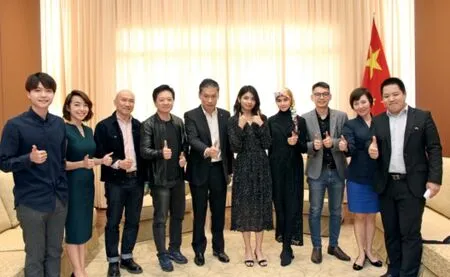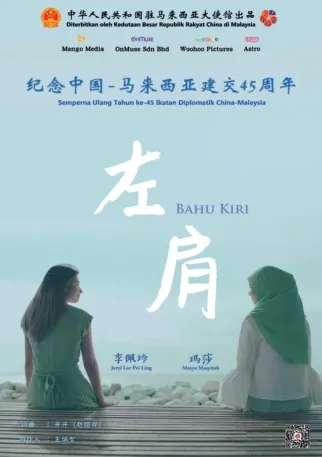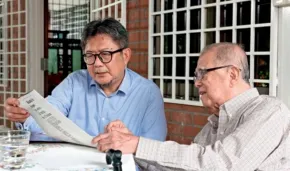GIFTS OF ALL TIME
By Wang Fengjuan
Malaysian and Chinese artists’ innovative way to celebrate the 45th anniversary of bilateral diplomatic relations
F orty-five years is nearly half a century,but merely a fleeting moment in the long course of history. This year marks the 45th anniversary of China-Malaysia diplomatic relations. Over the years, the two countries have witnessed tremendous changes and remained good friends and good partners. To commemorate this heart-warming occasion of friendship, artists from the two countries have worked together on songs, films and other art works to present special gifts for the people of the two countries.

The crew of Bahu Kiri,a song commemorating the 45th anniversary of Malaysia-China diplomatic relations, met the press at the Chinese Embassy in Malaysia on May 3.
Theme Song of Friendship
“My right shoulder blocks the wind and rain,and I save my left for you to lean on,” goes a line from Bahu Kiri (“Left Shoulder” in Malay), the theme song commemorating the 45th anniversary of China-Malaysia diplomatic relations, which also happens to be the theme song of a micro film called The Gift of Time.
On May 3, the Chinese Embassy in Malaysia organized a media event around the theme song and the micro film. “A friend once said to me that under the left shoulder is the heart,” commented Chen Chen, Chargé d'aあaires of the Chinese Embassy in Malaysia. “I think the title of the theme song is quite appropriate in that it expresses sincere hope that the two peoples will stand shoulder to shoulder so they can hear the heartbeats of each other.”
To commemorate the anniversary, the Chinese Embassy in Malaysia produced the theme song in association with Mango Media (Malaysia), OnMuse Sdn Bhd (Kuala Lumpur) and Astro (Beijing). Since its release, the song has become quite popular in Malaysia, topping Malaysian KTV charts. The mainstream media have reported on stories behind the scenes including production. Prime Minister Mahathir Mohamad commended the innovative production techniques after watching the music video for the song. He expressed belief that it would contribute to the mutual understanding between the two peoples.
“People-to-people connectivity is the cornerstone of the continuation of Sino-Malaysian friendship,” declared Chen. “I deeply feel the expectations of the people for sound bilateral relations.” The embassy aimed to produce the micro film from the perspective of the general public as they look back and forward on bilateral relations,framing cooperation between China and Malaysia like brothers and sisters in the same family. The embassy plans to present it to the people as a special gift at a reception commemorating the anniversary on May 27.
On why the theme song was titled “Left Shoulder,” Producer Zhao Kaiyi (Kaikai) attributed the reason to the way most people write and count numbers—starting from the left. In ancient Chinese culture, “left” meant the upper hand or“first, priority.” The symbolic meaning of the song is that China and Malaysia will remain shoulder to shoulder while developing their friendship.
While planning with the Malaysian team, Astro founder Huang Yan introduced the idea of having artists from the two sides sing the same song. She opined that music transcends national boundaries and can stride across time, space and race, which is the charm of music. A bilingual version of the song sung in both Chinese and Malay languages will help the people of the two countries feel closer like family.
Stories in Moving Pictures
“We hoped to tell stories of diあerent people as well as cultural and people-to-people exchanges between China and Malaysia from a real and simple perspective, so that viewers from both countries can feel the strong friendship of the times,”said Yang Yanjun, deputy director of film and television production at the China Intercontinental Communication Center (CICC). The Gift of Time is a series of documentaries sponsored by China's State Council Information Office and produced by CICC.It uses engaging stories to shed light on China's friendly exchanges with other countries around the world. This joint production will be the latest episode of the series.

A poster for the Bahu Kiri music video.
This micro film features an interview with Dato Zainuddin Yahya, former Malaysian ambassador to China, as well as perspectives from people of diあerent nationalities, ages and walks of life. The film begins with an ancient story, one that was discovered from unearthed cultural relics. In 671, Master Yijing (635-713),a famous Tang Dynasty monk, traveled aboard a Persian merchant ship leaving Guangzhou southward to the Kingdom of Shilifoshi on the Malay Peninsula (now the Kedah region of Malaysia), where he stayed for six months translating Buddhist scriptures, preaching Buddhism and introducing China to the Malaysian people. He also donated many classics to the region's collection.

Dato Zainuddin Yahya (left),former Malaysian ambassador to China and host of The Gift of Time,talks with Tan Sri Michael Chen, a witness to the establishment of diplomatic relations between Malaysia and China.
Tan Sri Michael Chen was a witness to the establishment of diplomatic relations between Malaysia and China. He recalls the experience in the film. In October 1971, the Asian-African-Latin American Table Tennis Tournament took place in Beijing. Chen, then president of the Malaysian Ping-Pong Association and secretary-general of the Alliance Party (predecessor of the present Barisan Nasional of Malaysia), led the Malaysian team on its trip to Beijing carrying a message from the Malaysian government—a letter written by Tun Abdul Razak Hussein, Malaysia's second prime minister, in his capacity as the president of the Olympic Council Of Malaysia—proposing the establishment of diplomatic relations. After witnessing the sincerity of Chinese leaders on diplomatic occasions such as the Bandung Conference, Malaysia considered China a trustworthy friend and reached out a hand to establish diplomatic relations. More than 40 years later, Malaysia-China relations have evolved into a comprehensive strategic partnership. For Michael Chen, now white-haired and in his 90s,memories of the experience remain fresh. “I was very fortunate to play a small role in breaking the ice between our two countries,” he said. “The establishment and development of this set of relations was based on goodwill and friendship between the two peoples.”
The film also features other touching stories.Director Wang Chaoge is among the interviewees.She planned and produced a large-scale liveaction show titled Encore Malacca as part of the “Impression” series. The show recounted stories of Zheng He (Cheng Ho, 1371-1433), a Ming Dynasty navigator who made seven voyages to the western seas. He sailed to Malacca five times and spread culture and art, friendship and love,which took root and blossomed in Malacca. Some sailors got settled there and married local Malay girls, who gave birth to Baba (boys) and Nyonya(girls). Their descendants are collectively known as Peranakan Chinese (Baba-Nyonya).
Wu Hengchan, chairman of the Han Culture Centre Malaysia, is also interviewed. Wu is committed to promoting the cultural exchange and cooperation between Malaysia and China.He has promoted Chinese literary masterpieces in Malaysia by encouraging primary school students to stage Journey to the West in class. He hopes such masterpieces can help the Malaysian children better understand Chinese culture.
In the micro film, local employees of the Durian Garden and the Alliance Steel at the Malaysia-China Kuantan Industrial Park expressed their expectations for enhanced economic and trade cooperation between the two countries. Each person shares a story closely related to the development of bilateral relations either historically or presently to illustrate the depths of friendship between China and Malaysia.
Wang Zuo, director of The Gift of Time, noted that the joint production would be the fifth episode. The previous four episodes of the documentary have already been released. They focus on Cambodia, Laos, Kazakhstan and Vietnam respectively. All have been warmly received by viewers.
Conducting so many interviews and editing them into such a short time was no small task,and the crew was impressed with how seriously each interviewee took the opportunity to share their stories. Towards the end of Michael Chen's interview, the old man got emotional. He gently wiped the aged yellowish photos with a white handkerchief and seemed to drift away into memories lost in time.
